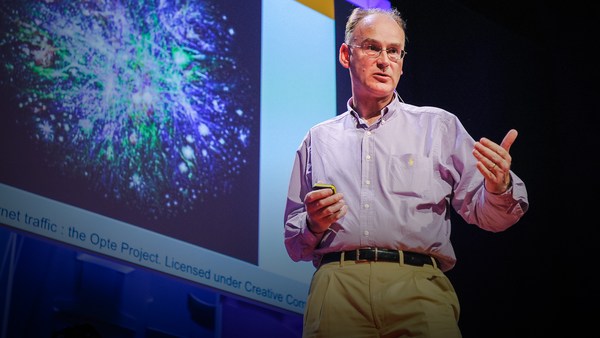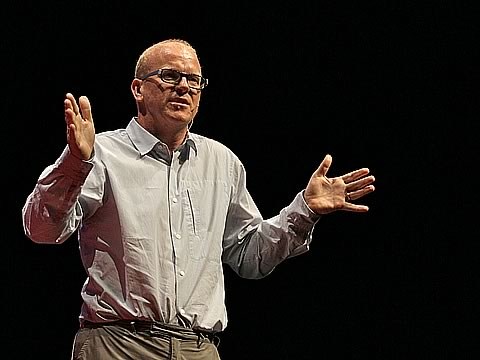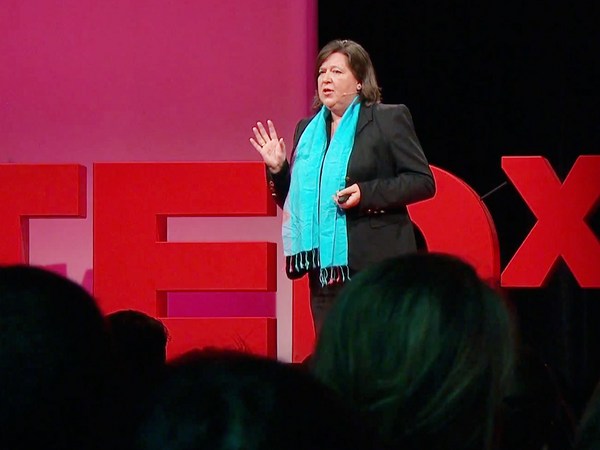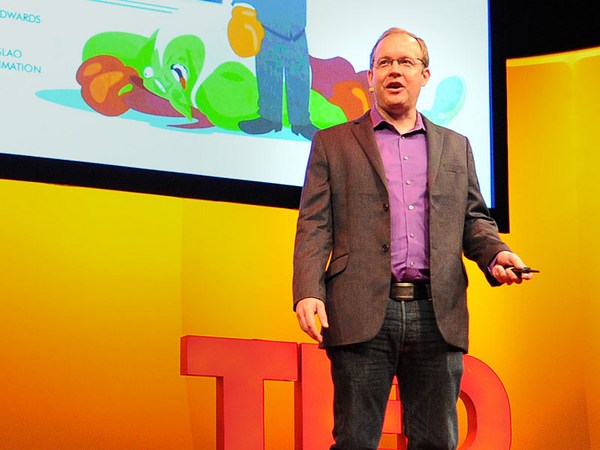I didn't always love unintended consequences, but I've really learned to appreciate them. I've learned that they're really the essence of what makes for progress, even when they seem to be terrible. And I'd like to review just how unintended consequences play the part that they do.
Let's go to 40,000 years before the present, to the time of the cultural explosion, when music, art, technology, so many of the things that we're enjoying today, so many of the things that are being demonstrated at TED were born. And the anthropologist Randall White has made a very interesting observation: that if our ancestors 40,000 years ago had been able to see what they had done, they wouldn't have really understood it. They were responding to immediate concerns. They were making it possible for us to do what they do, and yet, they didn't really understand how they did it.
Now let's advance to 10,000 years before the present. And this is when it really gets interesting. What about the domestication of grains? What about the origins of agriculture? What would our ancestors 10,000 years ago have said if they really had technology assessment? And I could just imagine the committees reporting back to them on where agriculture was going to take humanity, at least in the next few hundred years. It was really bad news. First of all, worse nutrition, maybe shorter life spans. It was simply awful for women. The skeletal remains from that period have shown that they were grinding grain morning, noon and night. And politically, it was awful. It was the beginning of a much higher degree of inequality among people. If there had been rational technology assessment then, I think they very well might have said, "Let's call the whole thing off."
Even now, our choices are having unintended effects. Historically, for example, chopsticks -- according to one Japanese anthropologist who wrote a dissertation about it at the University of Michigan -- resulted in long-term changes in the dentition, in the teeth, of the Japanese public. And we are also changing our teeth right now. There is evidence that the human mouth and teeth are growing smaller all the time. That's not necessarily a bad unintended consequence. But I think from the point of view of a Neanderthal, there would have been a lot of disapproval of the wimpish choppers that we now have. So these things are kind of relative to where you or your ancestors happen to stand.
In the ancient world there was a lot of respect for unintended consequences, and there was a very healthy sense of caution, reflected in the Tree of Knowledge, in Pandora's Box, and especially in the myth of Prometheus that's been so important in recent metaphors about technology. And that's all very true. The physicians of the ancient world -- especially the Egyptians, who started medicine as we know it -- were very conscious of what they could and couldn't treat. And the translations of the surviving texts say, "This I will not treat. This I cannot treat." They were very conscious. So were the followers of Hippocrates. The Hippocratic manuscripts also -- repeatedly, according to recent studies -- show how important it is not to do harm. More recently, Harvey Cushing, who really developed neurosurgery as we know it, who changed it from a field of medicine that had a majority of deaths resulting from surgery to one in which there was a hopeful outlook, he was very conscious that he was not always going to do the right thing. But he did his best, and he kept meticulous records that let him transform that branch of medicine.
Now if we look forward a bit to the 19th century, we find a new style of technology. What we find is, no longer simple tools, but systems. We find more and more complex arrangements of machines that make it harder and harder to diagnose what's going on. And the first people who saw that were the telegraphers of the mid-19th century, who were the original hackers. Thomas Edison would have been very, very comfortable in the atmosphere of a software firm today. And these hackers had a word for those mysterious bugs in telegraph systems that they called bugs. That was the origin of the word "bug." This consciousness, though, was a little slow to seep through the general population, even people who were very, very well informed.
Samuel Clemens, Mark Twain, was a big investor in the most complex machine of all times -- at least until 1918 -- registered with the U.S. Patent Office. That was the Paige typesetter. The Paige typesetter had 18,000 parts. The patent had 64 pages of text and 271 figures. It was such a beautiful machine because it did everything that a human being did in setting type -- including returning the type to its place, which was a very difficult thing. And Mark Twain, who knew all about typesetting, really was smitten by this machine. Unfortunately, he was smitten in more ways than one, because it made him bankrupt, and he had to tour the world speaking to recoup his money. And this was an important thing about 19th century technology, that all these relationships among parts could make the most brilliant idea fall apart, even when judged by the most expert people.
Now there is something else, though, in the early 20th century that made things even more complicated. And that was that safety technology itself could be a source of danger. The lesson of the Titanic, for a lot of the contemporaries, was that you must have enough lifeboats for everyone on the ship. And this was the result of the tragic loss of lives of people who could not get into them. However, there was another case, the Eastland, a ship that capsized in Chicago Harbor in 1915, and it killed 841 people -- that was 14 more than the passenger toll of the Titanic. The reason for it, in part, was the extra life boats that were added that made this already unstable ship even more unstable. And that again proves that when you're talking about unintended consequences, it's not that easy to know the right lessons to draw. It's really a question of the system, how the ship was loaded, the ballast and many other things.
So the 20th century, then, saw how much more complex reality was, but it also saw a positive side. It saw that invention could actually benefit from emergencies. It could benefit from tragedies. And my favorite example of that -- which is not really widely known as a technological miracle, but it may be one of the greatest of all times, was the scaling up of penicillin in the Second World War. Penicillin was discovered in 1928, but even by 1940, no commercially and medically useful quantities of it were being produced. A number of pharmaceutical companies were working on it. They were working on it independently, and they weren't getting anywhere. And the Government Research Bureau brought representatives together and told them that this is something that has to be done. And not only did they do it, but within two years, they scaled up penicillin from preparation in one-liter flasks to 10,000-gallon vats. That was how quickly penicillin was produced and became one of the greatest medical advances of all time. In the Second World War, too, the existence of solar radiation was demonstrated by studies of interference that was detected by the radar stations of Great Britain. So there were benefits in calamities -- benefits to pure science, as well as to applied science and medicine.
Now when we come to the period after the Second World War, unintended consequences get even more interesting. And my favorite example of that occurred beginning in 1976, when it was discovered that the bacteria causing Legionnaires disease had always been present in natural waters, but it was the precise temperature of the water in heating, ventilating and air conditioning systems that raised the right temperature for the maximum reproduction of Legionella bacillus. Well, technology to the rescue. So chemists got to work, and they developed a bactericide that became widely used in those systems.
But something else happened in the early 1980s, and that was that there was a mysterious epidemic of failures of tape drives all over the United States. And IBM, which made them, just didn't know what to do. They commissioned a group of their best scientists to investigate, and what they found was that all these tape drives were located near ventilation ducts. What happened was the bactericide was formulated with minute traces of tin. And these tin particles were deposited on the tape heads and were crashing the tape heads. So they reformulated the bactericide. But what's interesting to me is that this was the first case of a mechanical device suffering, at least indirectly, from a human disease. So it shows that we're really all in this together.
(Laughter)
In fact, it also shows something interesting, that although our capabilities and technology have been expanding geometrically, unfortunately, our ability to model their long-term behavior, which has also been increasing, has been increasing only arithmetically. So one of the characteristic problems of our time is how to close this gap between capabilities and foresight. One other very positive consequence of 20th century technology, though, was the way in which other kinds of calamities could lead to positive advances. There are two historians of business at the University of Maryland, Brent Goldfarb and David Kirsch, who have done some extremely interesting work, much of it still unpublished, on the history of major innovations. They have combined the list of major innovations, and they've discovered that the greatest number, the greatest decade, for fundamental innovations, as reflected in all of the lists that others have made -- a number of lists that they have merged -- was the Great Depression.
And nobody knows just why this was so, but one story can reflect something of it. It was the origin of the Xerox copier, which celebrated its 50th anniversary last year. And Chester Carlson, the inventor, was a patent attorney. He really was not intending to work in patent research, but he couldn't really find an alternative technical job. So this was the best job he could get. He was upset by the low quality and high cost of existing patent reproductions, and so he started to develop a system of dry photocopying, which he patented in the late 1930s -- and which became the first dry photocopier that was commercially practical in 1960. So we see that sometimes, as a result of these dislocations, as a result of people leaving their original intended career and going into something else where their creativity could make a difference, that depressions and all kinds of other unfortunate events can have a paradoxically stimulating effect on creativity.
What does this mean? It means, I think, that we're living in a time of unexpected possibilities. Think of the financial world, for example. The mentor of Warren Buffett, Benjamin Graham, developed his system of value investing as a result of his own losses in the 1929 crash. And he published that book in the early 1930s, and the book still exists in further editions and is still a fundamental textbook. So many important creative things can happen when people learn from disasters.
Now think of the large and small plagues that we have now -- bed bugs, killer bees, spam -- and it's very possible that the solutions to those will really extend well beyond the immediate question. If we think, for example, of Louis Pasteur, who in the 1860s was asked to study the diseases of silk worms for the silk industry, and his discoveries were really the beginning of the germ theory of disease. So very often, some kind of disaster -- sometimes the consequence, for example, of over-cultivation of silk worms, which was a problem in Europe at the time -- can be the key to something much bigger.
So this means that we need to take a different view of unintended consequences. We need to take a really positive view. We need to see what they can do for us. We need to learn from those figures that I mentioned. We need to learn, for example, from Dr. Cushing, who killed patients in the course of his early operations. He had to have some errors. He had to have some mistakes. And he learned meticulously from his mistakes. And as a result, when we say, "This isn't brain surgery," that pays tribute to how difficult it was for anyone to learn from their mistakes in a field of medicine that was considered so discouraging in its prospects. And we can also remember how the pharmaceutical companies were willing to pool their knowledge, to share their knowledge, in the face of an emergency, which they hadn't really been for years and years. They might have been able to do it earlier.
The message, then, for me, about unintended consequences is chaos happens; let's make better use of it.
Thank you very much.
(Applause)




